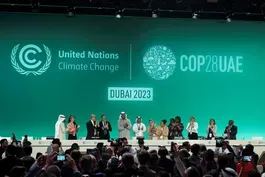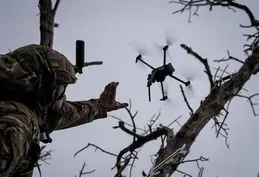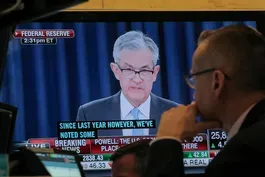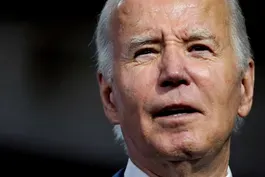
Israeli troops meet renewed resistance from Hamas in Gaza
Clip: 12/13/2023 | 9m 50sVideo has Closed Captions
Israel meets renewed resistance from Hamas amid pressure to reduce civilian casualties
Israeli troops met renewed and heavy resistance from Hamas militants across the Gaza Strip and civilians remain caught in the middle. The Gaza health ministry says nearly 19,000 people have been killed in the enclave since the Hamas terror attacks of Oct. 7. John Yang discussed the pressure on Israel to increase humanitarian aid and reduce civilian casualties with Natan Sachs.
Problems with Closed Captions? Closed Captioning Feedback
Problems with Closed Captions? Closed Captioning Feedback
Major corporate funding for the PBS News Hour is provided by BDO, BNSF, Consumer Cellular, American Cruise Lines, and Raymond James. Funding for the PBS NewsHour Weekend is provided by...

Israeli troops meet renewed resistance from Hamas in Gaza
Clip: 12/13/2023 | 9m 50sVideo has Closed Captions
Israeli troops met renewed and heavy resistance from Hamas militants across the Gaza Strip and civilians remain caught in the middle. The Gaza health ministry says nearly 19,000 people have been killed in the enclave since the Hamas terror attacks of Oct. 7. John Yang discussed the pressure on Israel to increase humanitarian aid and reduce civilian casualties with Natan Sachs.
Problems with Closed Captions? Closed Captioning Feedback
How to Watch PBS News Hour
PBS News Hour is available to stream on pbs.org and the free PBS App, available on iPhone, Apple TV, Android TV, Android smartphones, Amazon Fire TV, Amazon Fire Tablet, Roku, Samsung Smart TV, and Vizio.
Providing Support for PBS.org
Learn Moreabout PBS online sponsorshipThere was fierce combat between as Israel's ground operations met renewed# and heavy resistance from Hamas.
Civilians,## as ever, are caught in the middle, with the# Hamas-run Gaza Health Ministry saying nearly## 19,000 people have been killed# in the enclave since October 7.
John Yang begins our coverage.
JOHN YANG: In Gaza City, Israeli# troops engaged in heavy combat,## their campaign against Hamas raging on, even# after suffering their heaviest losses in weeks.
The IDF says nine soldiers were killed yesterday# when they were ambushed in Gaza City's Shaja'ia## neighborhood.
The military had set operations# in Northern Gaza all that wiped out Hamas'## hold there.
Israeli Prime Minister Benjamin# Netanyahu said setbacks will not deter him.
BENJAMIN NETANYAHU, Israeli Prime# Minister (through translator): We## had a very difficult the true heroes of Israel.
I want to say# in the clearest way, we continue to the## end.
I say this in the face of great pain, but# also in the face of international pressures.
Nothing will stop us.
We will go to# the end to victory, no less than that.
JOHN YANG: It comes as global support for# Israel's operation is dwindling by the day.
MAN: One hundred and fifty-three# in favor, 10 against.
JOHN YANG: Last night, the U.N. General Assembly## approved a nonbinding resolution# demanding an immediate ce ase-fire.
The United States was one# of just 10 nations to vote against it.
Today, the "NewsHour"'s Laura Barron-Lopez# pressed White House officials about President## Biden's comment yesterday that indiscriminate# bombing was eroding international support.
LAURA BARRON-LOPEZ: After the president's comments## yesterday talking abou said that Israel would continue its war# with or without international support.
Do you have a response to that?
JOHN KIRBY, NSC Coor suppor lose international support for what they're trying# to do.
They have every right JOHN YANG: Earlier, Mr. Biden met# with the families of the eight## American hostages held in Gaza.
It was# their second meeti NA'AMA WEINBERG, Cousin of Hamas Hostage:## Every day that passes by might be the last day# of the hostages while they're alive.
Every day,## we hear about new names and new hostages that came# there alive and now they're taken out as bodies.
JOHN YANG: In Gaza, residents already scrambling# for food and shelter are now dealing with heavy## rain.
In the Jabalia refugee camp, mourners# carry the dead through knee-deep water.
Across Gaza, tent cities muddied and# wet are now practically uninhabitable.
YASMIN MHANI, Displaced Gazan (through# translator): I woke up my 7-month-old,## who was soaking wet.
We blanket.
There are no covers, no mattresses, no# food, no water to drink.
This is the fifth place## I had to move to, fleeing from one place# to another with nothing but a T-shirt on.
JOHN YANG: Only adding to the misery of# hundreds of thousands of displaced Gazans.
For weeks, Biden administration officials# have pressed Prime Minister Netanyahu to## increase humanitarian aid, as well# as reduce civilian casualties.
And## now President Biden is taking# that up to a whole new level.
Natan Sachs is director of the Brookings# Institutions' Center for Middle Mr .
Sachs, what's behind this apparent public## rift between President Biden# and Prime Minister Netanyahu?
NATAN SACHS, Brookings Institution: Well,# there are both substantive differences## between the two parties and also political ones.
Substantively, the president and the# prime minister see quite es pecially the day after of the ground# operation in the Gaza Strip.
We're## looking at probably the last few weeks# of this phase of the ground operation.## And what follows has been described# very differently by the two leaders.
President Biden has said no Hamas# ruling the Gaza Strip after the war,## but also no Israeli reoccupation of the# Gaza Strip.
Netanyahu, on the other hand,## has described an indefinite Israeli security# overall responsibility in the Gaza Strip,## believing that no other force, international# or multinational, would have the wherewithal## and they would agree to pay the price to# conduct counterinsurgency in the Gaza Strip.
He's probably right in this assessment.# But there's also other differences.
The## president sees a major role for the# Palestinian Authority that currently## controls parts of the West Bank,# at least rejuvenated, reformed,## but then entering into the Gaza Strip# as the main Palestinian force there.
Netanyahu has staked out a position# that that would be unacceptable and## there would be no future at least for# this current form of the Palestinia Authority in the Gaza Strip.
That's# a major difference between t There's also politics involved.
Biden has a lot# of pressure domestically and internationall and sees a need to make clear that he's# been using not only his love for Israel,## but also his pressure, the leverage that he's# gained by showing this close affinity to Israel.
And Netanyahu is struggling for# his political future himself.
He's## now trailing badly in the polls# against the presumptive winner,## would be Benny Gantz, who's currently# in the coalition, but only temporarily.
And he's trying to stake out a position that# would differentiate between him and Benny Gantz,## in particular, on the question of the# Palestinian Authority and whether there## might be a Palestinian state and a# two-state solution down the so mething Netanyahu is hinting that he is the# only one who would pre very fearful of it today, and hinting that Benny# Gantz perhaps would not be able to prevent it.
JOHN YANG: You're talking about these differences,## and they had Why do you think President Biden# is bringing this public now?
NATAN SACHS: Well, we're nearing the end of# the year, and the American administration## has said privately to the Israelis that# this is likely the last few weeks of w the Americans would agree to as this phase# of the ground operations, so major ground## operations with a lot of Israeli forces in# now the Southern and Northern Gaza Strip.
We're not going to see the end of fighting.# Israel will continue to operate.
And,## of course, it depends on what it achieves# in the last few weeks, for example, the leaders of Hamas who were# behind the horrific attack of Oc and it managed to degrade# other Hamas infrastructure.
But, nonetheless, this phase is probably ending# in a few weeks.
And pressure on Israel, make sure that Israel# really does adhere to that kind of timeline,## but also to set the stage for what comes after.
As I said, there's deep disagreements there.# For Neta to voice it publicly, is not only an# attempt to push back diplomatically,## but also to signal to the audience that Netanyahu# cares about most perhaps, and that's his voters.
He is trailing badly, as I said,# and is really trying to stake out a## political position that would allow him to# remain in office for as long as possible.
JOHN YANG: Will this pressure from# the United States, from President## Biden have any effect on Prime Minister Netanyahu NATAN SACHS: It's a mixed bag there.
On the one han much traumatized by October 7, it is# reliving the trauma, it is feeling it,## talking about it incessantly daily, and has very# little patience for concessions to Palestinians.
On the other hand, President Biden stood by# Israel in a way that really moved Israeli## hearts and minds immediately after October 7.
And# that gives him a lot of cachet, a lot of leverage## in Israel.
So Netanyahu will voice very strong# public rhetoric against any pressure, but in## private and in practice he often follows suit in# terms of what the American administration wants.
So Biden has a lot of sway on Israel.
And# he's already used a lot of it in ways that## some of them have not been public, but there# is a limit to it.
The Israeli public and the## Israeli elites see it as a national interest# now, national imperative to bring down Hamas.
And so that -- in between there# is where Biden has leverage.
JOHN YANG: And is there a real threat, do# you think, that U.S. support could change,## could go down, or maybe have strings# attached, restrictions attached to it?
NATAN SACHS: I don't expect the fundamental# support from President Biden to change.## He clearly believes firmly in the main# goal, which is that Hamas after Octo 7 cannot be allowed to rule a statelet# neighboring Israel or any other country.
And in that, he is in full agreement with the# Israelis.
But we can see, and we have already## seen a change in the American position that# would give full support to the Israeli operation,## including the supply of munitions,# the very crucial supply of munitions.
There's another element in# which I don't expect a change,## and it's been a crucial one.
And that's the war# And that's a war between Israel, a major# war between Israel and Hezbollah and other## Iranian supported groups.
We have seen# fighting, we have seen, in fact, war,## but not at the scale that would be# -- that would show real devastation,## both in Israel proper, but also in Lebanon,# where the devastation between Hezbollah and## Israeli war would be absolutely catastrophic,# dwarf even what we have seen since October 7.
JOHN YANG: Natan Sachs of the# Brookings Institution Center## for Middle East Policy, thank you very much.
NATAN SACHS: Thank you.
COP28 nations agree to transition from fossil fuels
Video has Closed Captions
Nations at COP28 agree to transition away from fossil fuels, but loopholes remain (6m 27s)
Drone warfare transforms battle between Ukraine and Russia
Video has Closed Captions
How drone warfare has transformed the battle between Ukraine and Russia (7m 51s)
Federal Reserve suggests it may cut interest rates in 2024
Video has Closed Captions
Interest rates remain unchanged, but Federal Reserve signals cuts coming in 2024 (5m 32s)
Impeachment expert breaks down House GOP inquiry into Biden
Video has Closed Captions
Impeachment expert Michael Gerhardt breaks down House GOP inquiry into Biden (10m 53s)
The self-driving safety concerns that led to Tesla recall
Video has Closed Captions
The self-driving safety concerns that led to Tesla's recall of 2 million cars (5m 21s)
Providing Support for PBS.org
Learn Moreabout PBS online sponsorshipMajor corporate funding for the PBS News Hour is provided by BDO, BNSF, Consumer Cellular, American Cruise Lines, and Raymond James. Funding for the PBS NewsHour Weekend is provided by...
















